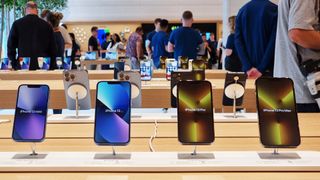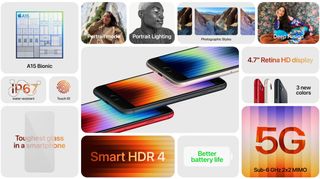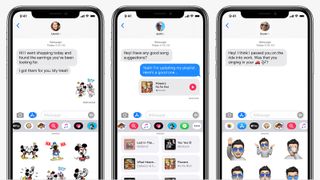Apple wants you to spend upwards of $429 on an iPhone to avoid green bubbles
Tim Cook's advice: "buy your mom an iPhone"

If you want to get rid of iMessage’s green bubbles when you’re texting with someone on Android then Tim Cook has the solution: buy them an iPhone.
Following Apple’s Far Out event – where the company announced the iPhone 14, iPhone 14 Pro, Apple Watch 8, Apple Watch Ultra, and AirPods Pro 2 – Tim Cook attended Vox Media’s Code 2022 event. There, Cook was asked about the possibility of iMessage adopting RCS messaging – the new standard text-messaging system used by Android smartphones.
Vox Media’s LiQuan Hunt complained to Cook about the issues he was having when trying to text his mom. In particular, the videos they shared with each other were always blurry, whereas they’d look great if they were using compatible messaging systems.
To help solve this issue Tim Cook told Hunt, “Buy your mom an iPhone.” (via The Verge)

If you were to head to the Apple store right now, the cheapest iPhone you could buy is the iPhone SE (2022) for $429 / £449 / AU$719. That’s before you consider factors like insurance and data packages.
We don’t know about you, but a $429 workaround to fix iMessage's RCS incompatibility isn’t a great option, so why isn’t Apple offering an alternative?
Analysis: Apple doesn’t want to help Android
During the same Vox Media event, when asked about making iMessage RCS-compatible Cook said “I don’t hear our users asking that we put a lot of energy in on that at this point.” As he puts it, because most iPhone users don’t care about RCS compatibility it isn’t something that Apple wants to spend time changing.
Get daily insight, inspiration and deals in your inbox
Get the hottest deals available in your inbox plus news, reviews, opinion, analysis and more from the TechRadar team.
That response certainly makes a lot of sense. Considering the bevy of messaging apps out there from WhatsApp to Facebook Messenger to Telegram to the many others, there are plenty of workarounds to the iMessage-RCS problem. If you want to send a picture or video, just send it a different way.
But there’s a much bigger reason Apple isn’t concerned about making iMessage RCS compatible – or including an iMessage app on Android. It has nothing to gain and a lot to lose.
When Apple and Epic Games were at trial over Fortnite being kicked off the App Store several internal Apple and Epic documents came to light. One was an email from Craig Federighi (Apple’s senior vice president of software engineering) which read “iMessage on Android would simply serve to remove [an] obstacle to iPhone families giving their kids Android phones.”

And Apple’s approach to getting kids onto the iPhone platform has worked. According to a Fall 2021 report, 87% of US teens surveyed owned an iPhone. By comparison, across the whole US only 46.9% of smartphone users own an iPhone.
If Gen Z’s brand loyalty persists into adulthood – perhaps because they’ve grown accustomed to Apple’s way of doing things, love the interoperability of its products, or just generally feel locked into iPhone because of their App Store purchases – then we could see the makeup of the US’s smartphone market shift more in Apple’s favor. These Gen Z adults would be more likely to buy their kids iPhones, and the cycle would continue.
If Tim Cook's comment has convinced you to pick up an iPhone then you might want to use our guide to decide which Apple smartphone is the best iPhone for you. Alternatively, you can check out the iPhone 14 deals we've found so you can get the best price on your iPhone 14 preorder.

Hamish is a Senior Staff Writer for TechRadar and you’ll see his name appearing on articles across nearly every topic on the site from smart home deals to speaker reviews to graphics card news and everything in between. He uses his broad range of knowledge to help explain the latest gadgets and if they’re a must-buy or a fad fueled by hype. Though his specialty is writing about everything going on in the world of virtual reality and augmented reality.
